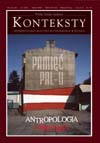Nostalgia za PRL-em. Próba analizy
Nostalgia for People’s Poland. An Attempted Analysis
Author(s): Marcin BrockiSubject(s): Anthropology
Published by: Instytut Sztuki Polskiej Akademii Nauk
Keywords: People's Republic of Poland; history; anthropology
Summary/Abstract: Nostalgia for the People’s Republic of Poland (PRL) is a phenomenon whose causes, significance and social function have not as yet been satisfactorily interpreted. The author based himself on ethnographic material created as part of field studies in order to try to situate the memory of PRL within the communication order in which it is ”used”. By resorting to elements of the semiotic theory of the Tartu-Moscow school as regards research focused on memory, and the reflections of Erving Goffman on the permanence of the order of daily and ritualised forms of communication, the author formulated a thesis claiming that recollections of PRL serve as a point of departure for own interpretations of the present-day situation. While analyzing field material he concluded that after the turnabout of 1989, changing institutions of daily life were still interpreted within codes once binding in People’s Poland. Since there exists a divergence between those codes and a new way of acting, it became an incomprehensible “foreign tongue” that produced animosity towards the new and sentiment for the already familiar (nostalgia). Nostalgia should thus be deciphered as a sui generis interpretation of the present day from a communication perspective – nostalgia interprets changes within the range of communication forms and, primarily, changes of the number of interpersonal connections (building a feeling of a bond) and the possibility of realising ritualised forms of daily interactions.
Journal: Konteksty
- Issue Year: 2011
- Issue No: 01
- Page Range: 26-33
- Page Count: 8
- Language: Polish
- Content File-PDF

